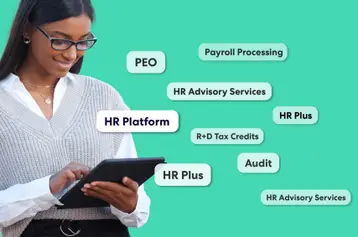Let an Administrative Services Organization (ASO) Help with Your HR Woes

Table of contents
- 1.Understanding Administrative Services Organizations
- 2.Key functions and services offered by ASOs
- 3.How ASOs Benefit Small Businesses
- 4.Comparing ASOs and PEOs
- 5.What is a PEO?
- 6.Choosing the Right Model for Your Business
- 7.Enhance Your Business With an Administrative Services Organization
As a small business owner, you wear so many hats that you probably need a separate closet to store them all! With seemingly dozens of tasks demanding attention, it can be challenging to carve out the time to spend on "move the needle" projects.
HR responsibilities require specialized knowledge and can soak up a lot of time. For example, do you relish the task of monitoring the regulatory changes in all the payroll tax jurisdictions applicable to your business? Even if you are highly skilled in entrepreneurship, you may struggle to balance HR's demands against other business management priorities.
That's when an administrative services organization (ASO) may be the solution. What is an ASO? What are its benefits? And, how does it differ from professional employer organizations (PEOs)? We'll answer all these questions here.
Understanding Administrative Services Organizations
An ASO is an HR outsourcing organization that can provide software and human expertise to cover a wide range of functions. The ASO and its client is not in a co-employment relationship, as is the case with a PEO. Businesses can, to some extent, pick and choose the services they use from an ASO.
Key functions and services offered by ASOs
ASOs provide a wide range of HR outsourcing services that help business administration initiatives. These services may come with an advanced Human Resources Information System (HRIS), a cloud-based HR software platform. Some of the most popular ASO services are:
- Payroll administration. This includes calculating and processing the payroll, taking out deductions, and issuing paychecks to employees for payroll run through an ASO HRIS.
- Employee benefits administration. Monitor and support employer-sponsored employee benefits. The client is usually responsible for selecting and offering benefits. But the ASO may be able to help administer health insurance, retirement plans, time and attendance, sick leave, and other benefits.
- HR support. This includes providing tools to help clients with employee onboarding and training, performance reviews, and many other tasks.
- Risk mitigation. ASOs can help mitigate certain HR risks with their HR expertise and best practices.
- Strategic planning and consulting. ASOs may offer strategic HR insight and consulting services.
How ASOs Benefit Small Businesses
Since small businesses often don't have lots of staff or big budgets, working with an ASO can provide them with some major benefits:
- Cost savings. Small organizations need to make every dollar count. Working with an ASO for one or a half dozen HR functions can be less expensive than hiring a full-time employee to handle those same tasks. Even the highest tiers of service can be, on average, $94,000 cheaper than hiring in house.
- Superior HR expertise. Small companies may not have a person on staff who is specialized in HR functions. ASOs can provide highly skilled professionals with lots of experience, helping small businesses stay up-to-date with HR best practices.
- Time savings. By hiring an ASO, small business owners free up time, which lets them focus on big-picture goals that grow the company and keep it competitive.
- Improved efficiency. Streamlining administrative workflows, reducing paperwork, and automating processes enhances organizational efficiency.
- Greater flexibility. Being able to choose certain services they need from an ASO allows business owners the option to customize their package based on their organization's unique needs.
- Enhanced employee satisfaction. ASOs provide streamlined processes for payroll processing and other customer-facing HR tasks. Smooth, hassle-less experiences helps to increase employee satisfaction and boost morale.
Comparing ASOs and PEOs
When organizations consider human resources outsourcing, they typically look at professional employer organizations and administrative services organizations. These outsourcing companies are structured quite differently.
What is a PEO?
A PEO is an outsourcing company that provides comprehensive HR services. A PEO is the co-employer, or the employer of record for the client's employees for tax purposes. The client manages the day-to-day business operations and workforce, while the PEO helps support the HR responsibilities. The organization's employees continue working under the client's supervision and rules. PEOs can helps with HR functions including payroll processing, benefits administration of its sponsored plan, HR compliance, risk mitigation, and HR administration. PEOs can provide the clients with access to a much wider range of benefits than the client could typically obtain on its own.
While ASOs and PEOs both offer numerous HR services for small businesses, a PEO is more comprehensive. For example:
- HR administration. ASOs typically offer administrative support services such as payroll processing, HR software solutions, employee benefits administration, and HR advisory services. PEOs handle a broader range of HR functions including payroll processing, access to benefits, best practices and expertise to help navigate HR compliance, risk mitigation, and recruiting and talent management tools.
- Benefits. ASOs may offer assistance with benefits administration, such as helping to manage enrollment, but the client typically retains more control over selecting and offering benefits. PEOs provide access to benefits. These are usually big-company benefits for small and medium-sized companies.
- Risk mitigation. ASOs can help companies with payroll tax compliance and administer workers’ compensation payroll reporting. PEOs provides employment practices liability insurance and other resources that helps clients prevent and mitigate employment-related claims.
- HR Compliance. ASOs provide comprehensive services to help with HR compliance. A PEO provides best practices and compliance experts so clients can stay up to date with every changing employment-related rules. However, the client always retain full responsibility for HR compliance and assumes all risks and liabilities associated with HR functions.
Choosing the Right Model for Your Business
How can a small business leader know which option will serve their organization better, a PEO or ASO? Here are some questions to help make a smart decision:
- How much control do you want over your company's HR functions? If you want to maintain your status as the employer of record for payroll tax purposes, an ASO may be the better choice. If you want to seek advantages from the PEO being the employer of record for payroll tax purposes, then PEO may be the better option.
- How many employee benefits do you need to outsource? ASOs may have limited options that’s provided by other vendors, and PEOs generally provide access to a wider range of benefit options.
- What is your budget for HR? ASOs may provide for different options of subscriptions with add-on products, and different payment options and term; whereas PEOs usually charge a percentage based on total payroll or a per-employee per month flat fee for usually an annual term agreement for comprehensive HR services. With a PEO, a company might be paying for services it does not need.
- Are you looking for a strategic, long-term HR provider? PEOs tend to provide more in-depth services in regards to long-term business strategy. ASOs may offer strategy and consulting services but may not provide the same depth as a PEO.
Enhance Your Business With an Administrative Services Organization
An ASO can be a great choice for businesses looking for a cost-effective, less involved approach to HR and payroll tasks. You can gain access to a dedicated team of experienced professionals who will help with the responsibilities of a traditional HR department. Instead of worrying about payroll processing, employee onboarding tool and benefits administration, you can focus on big-picture tasks like developing new products and moving into new markets.
TriNet's HR Plus offers the ASO solution you may need with different levels of service to add-on to help you grow your business cost-effectively. Learn more about our solutions and book a demo today.
This communication is for informational purposes only, is not legal, tax or accounting advice, and is not an offer to sell, buy or procure insurance.
This article may contain hyperlinks to websites operated by parties other than TriNet. Such hyperlinks are provided for reference only. TriNet does not control such web sites and is not responsible for their content. Inclusion of such hyperlinks on TriNet.com does not necessarily imply any endorsement of the material on such websites or association with their operators.

TriNet Team
Table of contents
- 1.Understanding Administrative Services Organizations
- 2.Key functions and services offered by ASOs
- 3.How ASOs Benefit Small Businesses
- 4.Comparing ASOs and PEOs
- 5.What is a PEO?
- 6.Choosing the Right Model for Your Business
- 7.Enhance Your Business With an Administrative Services Organization






